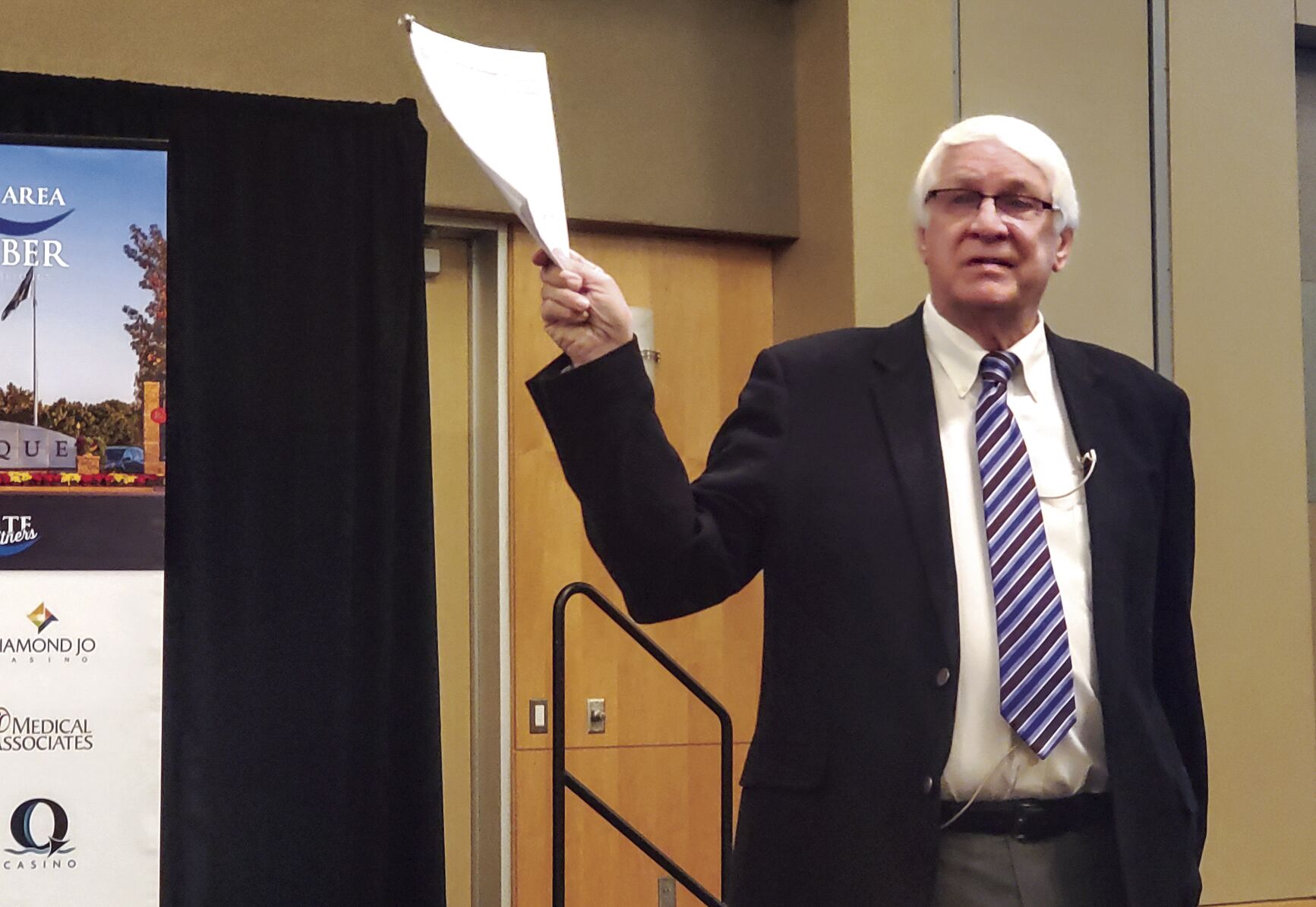An economic expert on Thursday told a Dubuque crowd that he expects a slow start to the U.S. economy this year.
Stephen Happel, professor of economics at Arizona State University, was the keynote speaker at Dubuque Area Chamber of Commerce’s 2024 Forecast Luncheon. More than 250 people attended the event at Grand River Center.
Happel started his assessment by saying 2023 was a better year than many expected: Gross domestic product rose roughly 2.4%, and many ongoing supply-chain disruptions were resolved.
He still expressed fears, however, that an economic slump is on the way.
“Overall, this turned out to be a better year than a lot of people expected,” Happel said. “… But I just don’t see how we aren’t going to have a slowdown, possibly a recession, in the year to come.”
Happel credited his concerns to the recent decrease in the U.S. money supply and a growing disparity between gross domestic product and gross domestic income. Such factors could contribute to a full-on recession, he said, though he expects it would be mild.
Overall impacts will depend on the level and frequency of expected interest rate cuts from the Federal Reserve, regulatory impacts from the upcoming election cycle and future spending habits of U.S. consumers, he said.
“For me, this decrease in the money supply is a real red flag,” Happel said. “… But I’m still an optimist, so I always say to never underestimate the American consumer or the innovative side of the American public to address our problems.”
According to data from Blue Chip Economic Forecast, which Happel cited at the event, the 30 top forecasting firms expect average GDP increases of around 1.3% in 2024, with maximum expectations of 2.4% growth to a minimum estimation of 0.6%.
Happel said that range of figures expresses the high level of uncertainty facing the U.S. economy this year, part of which stems from the upcoming election cycle.
Different candidates have varying economic policies, he said, which in turn would affect future economic regulation or deregulation depending on which party controls Congress and White House.
“A lot depends on this election,” he told the crowd.
Happel then touched on issues of population and job growth. According to November data from Arizona State University, Iowa ranks 46th in the country in terms of year-over-year overall non-farm job growth, due in large part to minimal growth in industries such as service and government jobs.
And Dubuque fares even worse than some of its other Iowa neighbors, he added, ranking 339th out of 361 metropolitan statistical areas nationwide with under 1 million jobs, according to ASU data.
“Overall, it’s not a case of jumping for joy,” he said.
To begin to address that issue, Happel said Dubuque — and smaller metros like it — need to focus on population growth. In response to an audience member inquiring about how to do so, he recommended lowering taxes and eliminating “onerous” regulations.
“You also can’t overlook the importance of having the attitude of, ‘We are a vibrant community, and we ought to take pride in Dubuque,’” he said. “… That sense of pride is important.”
The themes of population and job growth resonated with Molly Grover, Dubuque Area Chamber of Commerce president and CEO. After the luncheon, she reflected that those same themes underlie the chamber’s efforts to promote patronage of local businesses.
“One thing that really stood out was how he said to never underestimate the power and influence of the consumer,” Grover said. “… We talk all the time about buying local and supporting local to keep those dollars in the community, and the consumers — the people — have everything to do with that.”
Justine Paradiso, vice president of events and programs at the chamber, echoed Grover’s sentiment and added that the forecast overall was meant to be a tool for area businesses as they planned for the year ahead.
She also said Happel’s appearance reflected the chamber’s efforts to broaden the annual luncheon’s scope to include national economic impacts and expectations, as well as local and regional ones.
“The economy is an ever-changing thing,” she said. “Nobody can say for sure what will happen, sort of like a weather forecast. … But you need to have some idea of what could potentially happen so you can factor that into what you hear and learn later on.”


